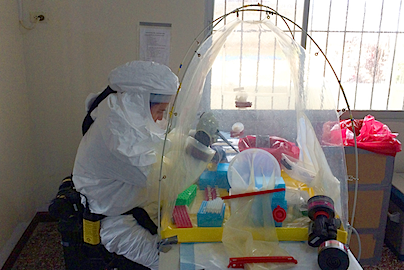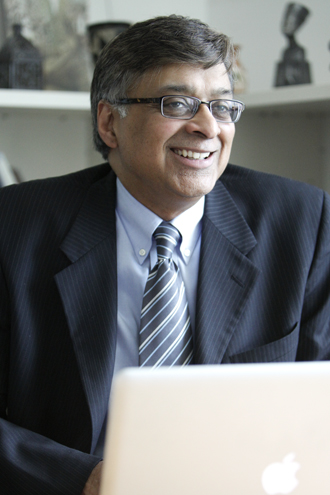Ebola in West Africa: The outbreak's impact and a look to the future
Heller School professors described the impact of the virus on health care systems and the economy in West Africa
 Photo by Chief Petty Officer Jerrold Diederich, U.S. Army Africa, 2014
Photo by Chief Petty Officer Jerrold Diederich, U.S. Army Africa, 2014U.S. Navy Lt. Jose Garcia, inactivates the Ebola virus in each specimen, while wearing his personal protective equipment.
For three years, public health physician Theo J.C. Lippeveld worked to restore and improve the health care system in Liberia following civil war, and progress was being made – vaccinations were on the rise, fertility rates were dropping and so were stunting rates among children.
"We were on the right pathway," Lippeveld said. "And then...Ebola strikes."
 |
| Theo Lippeveld |
Lippeveld, a vice president at public health consulting firm John Snow, Inc., left Liberia earlier this year and is now teaching as an adjunct professor at the Heller School for Social Policy and Management. He and Allyala K. Nandakumar, director of the PhD Program at the Heller School and chief economist of the Global Health Bureau at the U.S. Agency for International Development, spoke in an event at the Heller School Oct. 31.
The pair described the impact the Ebola outbreak has had on the region, the international response and the challenges that need to be overcome to bring the outbreak under control.
Lippeveld, an expert in health services planning and health information systems, said there were three contributors to the outbreak that need to be examined and learned from: An exponential spread in the initial phase of the epidemic, a slow initial response from international agencies, and the failing health systems in the three countries most affected.
An Ebola outbreak was unprecedented in West Africa and the region wasn't prepared, Lippeveld said. In Liberia, nurses weren't trained to handle the disease, and there was deep skepticism in the early stages of the outbreak, followed by panic, Lippeveld said. As panic spread, health centers that once treated diseases like malaria and tuberculosis began to shutdown.
"People are dying not from Ebola, they are dying from every day diseases because the health services were just shutdown," Lippeveld said.
From an economic perspective, the outbreak has had a profound effect in West Africa, including the fuel and agriculture sectors, Nandakumar said. Liberia is projected to see its rate of growth cut by 50 percent, and the country is expected to run a significant deficit.
 |
|
Allyala Krishna Nandakumar |
"From early August to today, when you look at what the U.S. government has done, it's quite outstanding," he said.
An example of the many challenges in fighting the epidemic is production of the suits worn by those treating the outbreak, and how to safely use them in a hot climate, Nandakumar said. The greatest exposure risk for health workers is when they take the suits off, and the suits, which haven't been manufactured since the SARS outbreak, weren't designed to be worn in a hot climate. Workers wearing the suits need to take them off about every hour due to the heat.
While the response in recent months has been strong, it will take considerable time to get Ebola under control, Nandakumar said.
"In the short-term you have to stand up the primary health care system to do what it is supposed to be doing," he said. "But then there is the long term. You really have to build a health care system that is stronger than what it was before Ebola hit. The question we need to look at is: What would such a new system look like?"
Categories: Business, Humanities and Social Sciences, International Affairs, Research, Science and Technology





